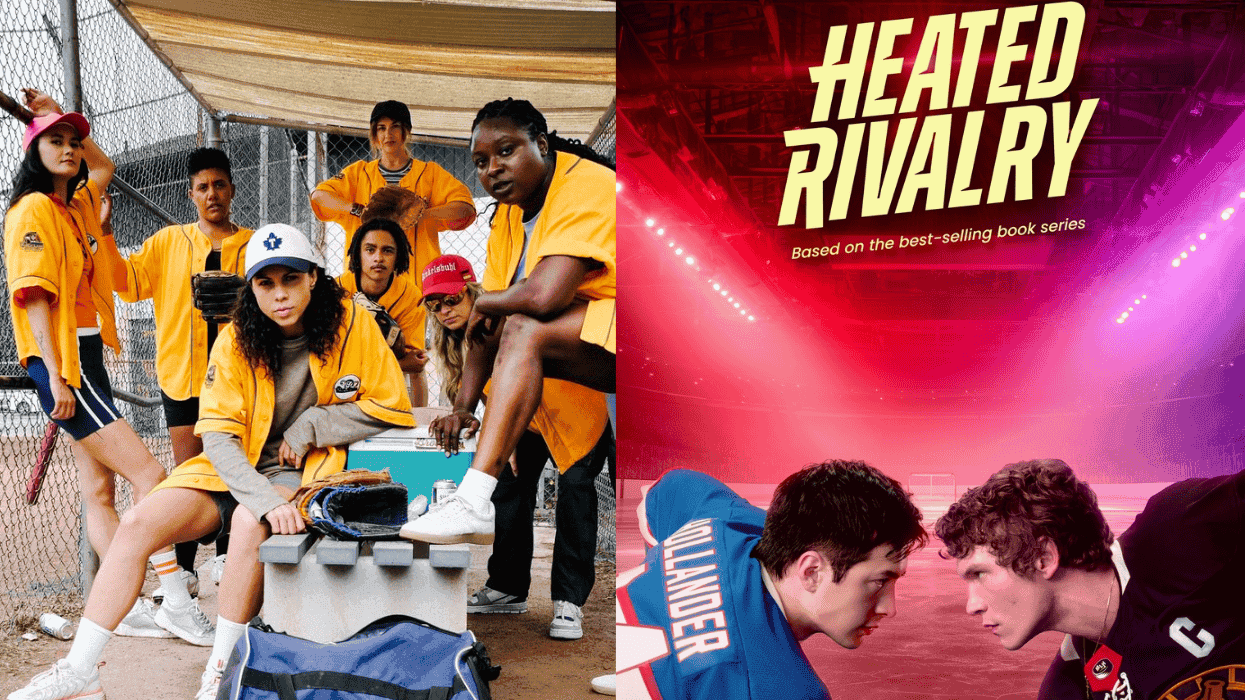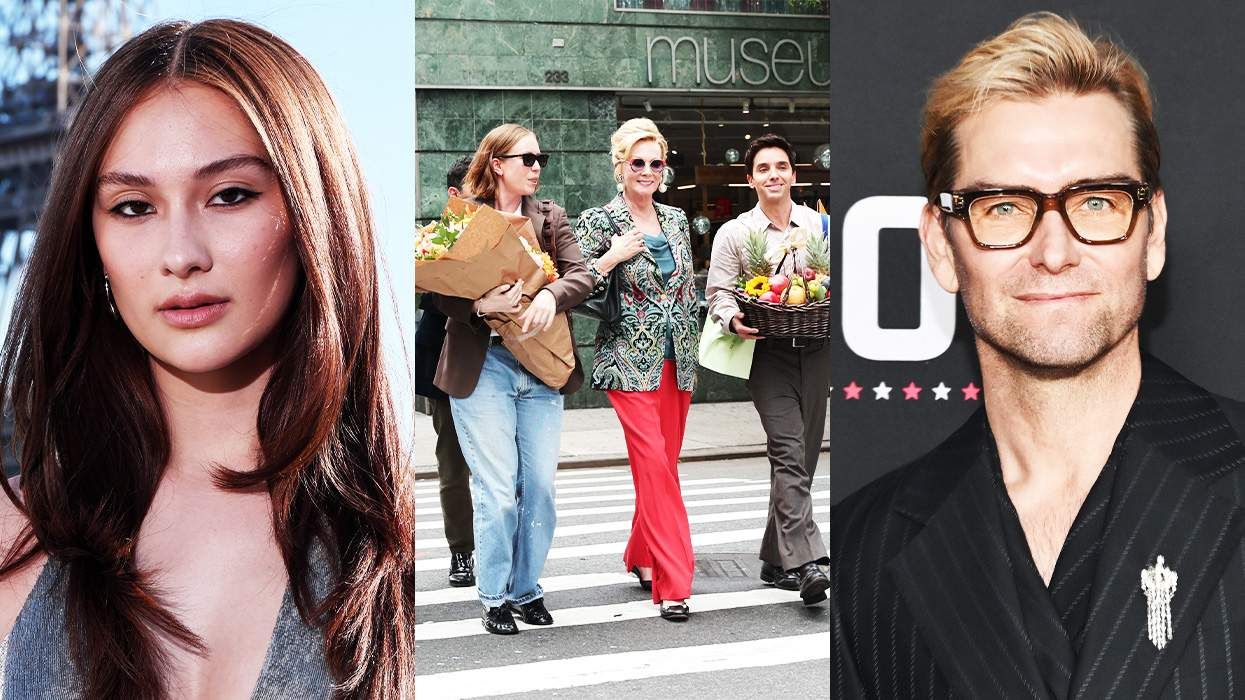If you were to turn on your television at this very moment, chances are extremely high that you'll see Carson Kressley. Since debuting at the original "Fashion Savant" in Queer Eye for the Straight Guy in 2003, Kressley has been a part of RuPaul's Drag Race, Drag Race All Stars, Get A Room With Carson and Thom on Bravo, Carson Nation on OWN, The Apprentice, Dancing With the Stars, and Miss Universe -- to name a few.
On this week's episode of LGBTQ&A, Kressley sat down to talk about criticism the LGBTQ+ community had of the original Queer Eye, dating and being called "daddy," and recently realizing, "Oh, my God. I've outlived Judy Garland."
Listen and subscribe on Apple Podcasts, Spotify, and Stitcher.
Jeffrey Masters: I don't think it's insignificant that the original Queer Eye came out just a few years after Matthew Shepard was murdered and as we were coming out of the AIDS crisis. The show put five gay men on camera and it had nothing to do with violence or death.
Carson Kressley: Just five gay guys who happened to be themselves. We weren't playing characters and we weren't using anybody else's words. We were just five gay guys who happened to be, I think, pretty good at their jobs, in interior design or fashion or grooming.
And just helping people, that dynamic was a little bit different. Sometimes even me personally, I would be a little bit scared of big, macho, straight guys, and maybe they had some misconceptions about me, and we were allowed to have a dialogue on the show, and help each other out. I think that was one of the reasons the show was received so well, because we were understanding each other and helping each other.
In a way, you were also introducing nice straight people to queer people.
And hair product, which is so important.
That's the power of being on TV: it makes you visible. That's what moves the needle forward.
Some of the criticism of the show at the time said it played into cliches about the community. Was that something that you and the cast talked about?
Yeah, and I would just say, listen, no one's telling me how to speak, or what words to say, or what to do, or how to act. I'm just being myself, and there's nothing stereotypical about being your authentic self.
And if you think that gay people are great at designing interiors, and styling clothes, or being a fashion designer, I think it's a compliment. So I will take it all day long.
We are an artistic community that's really good, traditionally, at those things. And there are some of us who don't have the gay aesthetic gene either. It doesn't always present itself. But I think we did great work. And honestly, at the end of the day, we were just being ourselves, so to say that we were being stereotypical was not really accurate because what we were being was who we are.
On Hollywood Medium, you asked, "Will I ever have a love life?" Was that a joke or were you being serious?
Oh, that's not a joke. That's very, very ... that's where it turns tragic. I have had them, and I will have them again, but I don't have one currently.
So, if you know anybody, you can find me on Grindr at...no, I'm kidding. Sort of.
Are you on Grindr?
No. But you might see me in other places.
Is this uncomfortable? Can I ask about this?
No, no, I'm not. It's going to be hard to make me uncomfortable.
Has anyone ever tried to call you "Daddy"?
I think people have already called me "Daddy" or maybe even "Zaddy," which I'm not ... is that like a young daddy? Oh, I'll take Zaddy.
It seems like gay men over a certain age are automatically lumped into that daddy category.
Right, right. And now I'm 50, so I really feel like now I deserve it.
Do you like that?
It makes me feel weird about dating people that are a lot younger than me, because after 50, then you could almost...people that I have been on dates with have been born after I graduated college, or say, "It's my mom's birthday tomorrow." And I'm like, "Oh, how old is she?" And they'll be like, "She's 40." And I was like, "Stop. I can't be older than your mom."
You turned 50 just a few weeks ago. Was that a big moment?
I didn't think it was. But this is going to be like the gayest answer in the world, I went to see the movie Judy, OK? A gay icon.
Anyway, at the end, they do those sad lines of text across the screen. We're all crying from the last number, at least me and the other gays in the theater in Palm Springs. And it says she died in June of 1969 and she was 47 years old. I was like, "Oh, my God. I've outlived Judy Garland. She was only 47."
So I thought to myself, just making it to 50, and you hear this all the time from people who reach milestones, you're so lucky to be around. Because you have friends that are no longer here or you see these icons who were so impactful in the world, and they only got 47 years. So I feel like I have another 50 to do great stuff. I'm so lucky to have made it this far.
I've actually had more years on the earth than Judy Garland, so think about that.
With dating, did doing Queer Eye help or hurt you in that department?
I think it definitely helps. I was always very popular. And I was always good at dating.
I think doing the Queer Eye thing at least gives you something in common and to talk about right away. You're a somewhat recognizable face. The thing about if you are well-known or semi-famous or whatever it is, sometimes people feel like they know you, the complete person, from what they've seen on TV. So there's a lot of preconceived conceptions about you, which can be hard.
You said that you've not always been this confident of a person.
No, I wasn't. I was very, very shy as a kid.
When did that change?
Until about junior high, and then I realized...and this is again the benefit of growing up gay, and there's all the bad stuff of thinking that your family's not going to love you and worrying about being outed. And never really thinking that you're normal.
But the good thing, the flip side of that ... I think everything in life, the terrible things, often yield good things. And by the time I was in middle school, I had realized if I didn't want to get picked on, or if I didn't want to literally get hung inside a locker by a bully, I would have to diffuse the situation sooner.
So if I could make people laugh, whether it was being the class clown, or saying something sassy to the substitute teacher, whatever it was, to deflect, and to save me, I would do it. That really cultivated a sense of humor, and timing, and sassiness, and all of the stuff that helped me in my career. Which is really what people really enjoy about me.
Were these conscious things that you developed?
No, it wasn't a conscious thing. It was a survival mechanism. And I must have gotten a laugh at some point and thought, Well, that worked. And then you subconsciously keep doing it.
That really made things easier for me. So by high school, I was kind of popular. And then college, it was great. Moving to New York City was heaven.
You've won world championships as a horseback rider. This might be a crazy question, but do you see a connection between your love of fashion and your love of horses?
The connection is the love of beauty. I love anything that's beautiful and well-crafted. It could be furniture, it can be a piece of art, it could be a horse. I'm a lover of beauty and it doesn't really matter what form it takes.
Is that what initially attracted you to horses?
Yeah, there was a certain beauty. But also, I grew up on a horse farm, so my ABC After-School Special is me alone with the horses having conversations like, "Why does everyone hate me?" I've always had a connection to animals and the non-judgemental, unconditional love of when people get it with dogs, I just happened to be around horses.
And they are so magnificent and so gorgeous and so powerful.
Listen and subscribe to LGBTQ&A on Apple Podcasts, Spotify, or Sticher.
This interview was originally recorded in December 2019.
Episodes come out every Tuesday. LGBTQ&A is The Advocate's weekly interview podcast hosted by Jeffrey Masters.















Charlie Kirk DID say stoning gay people was the 'perfect law' — and these other heinous quotes
These are some of his worst comments about LGBTQ+ people made by Charlie Kirk.